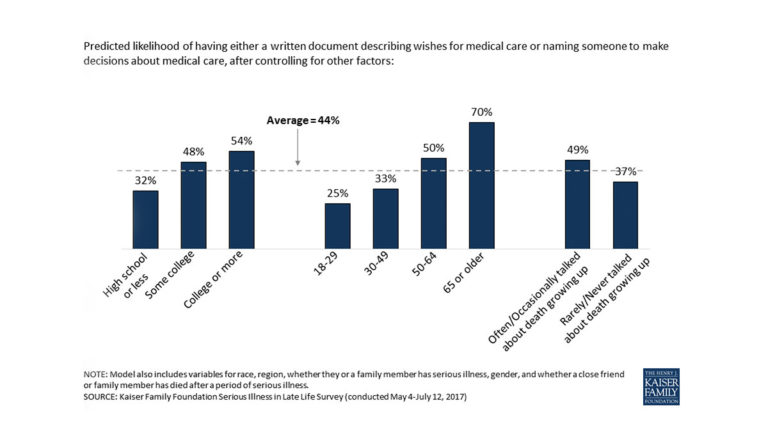Planning for End-of-Life
Age, education, and discussions about death are predictors of having a written plan or identifying someone to make decisions about end-of-life care.

Read Time: 2 minutes
Published:
Results of a recent survey show that older adults are more likely than younger people to have documented their end-of-life wishes. Despite this, few adults with or without written documents discussed end-of-life care with their doctors.
The figure above shows that on average, all people surveyed had a 44% likelihood of having a written plan or identifying someone to make decisions about their end-of-life care. Age, education, and discussions about death are predictors of having such a plan. Those with a college education or higher were most likely to have a written document, compared to those with some college, high school, or less education. Also, talking about death while growing up correlated to having written documents about wishes for medical care.
Talking about death while growing up correlated to having written documents about wishes for medical care.
In addition, adults aged 65 or older were most likely to have a written document or to name someone to take charge of their medical decisions. Although older adults are more likely to have some end-of-life plan, the survey found that seriously ill older adults are less likely than their healthier counterparts to report having written documents. This is linked to seriously ill people reporting lower education levels, which the above figure depicts as being a strong predictor of not having a written plan for end-of-life.
Care settings encouraging or mandating doctors to use an advanced directive toolkit, like the one created by the National Physician Orders for Life-Sustaining Treatment Paradigm, can improve the communication gap, and help seriously ill patients better express their wishes for end-of-life care.
Databyte via Bianca DiJulio, Liz Hamel, Bryan Wu, and Mollyann Brodie, Serious Illness in Late Life: The Public’s Views and Experiences. Kaiser Family Foundation.



